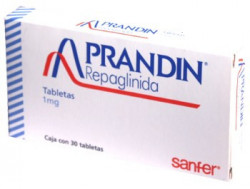Prandin (repaglinide) Coupons, Discounts & Cost
Prandin (repaglinide) tablets are used as an adjunct to diet and exercise. One way to save money on the Prandin retail cost regardless of income and insurance status is to use Prandin coupons or discount cards from RXCoupons. Use this Repaglinide coupon at this online pharmacy and receive up to 75% off the sale price.
Prandin medicinal properties
Prandin (repaglinide) tablets are used as an adjunct to diet and exercise. This drug helps control blood sugar levels in adult patients with type 2 diabetes mellitus.
Repaglinide affects the pancreas by stimulating secretion of insulin. Prandin is often used in combination with other drugs (such as metformin).
Prandin interacts with other drugs. Therefore, be sure to tell your physician about all medications you take with Prandin.
The standard dose is 0.5 mg before each meal (it can be increased to 4 mg). The maximum dose is 16 mg. Prandin should be used with caution by patients with kidney or liver disorders.
Prandin increases insulin levels. Low blood sugar levels can lead to excessive sweating, tremors, loss of consciousness, coma or convulsions. In addition, Prandin therapy may be associated with headache, pain in muscles and joints.
Prandin contraindications
This medication is not used in the following cases:
- Type 1 diabetes;
- Diabetic ketoacidosis, diabetic precoma and coma;
- Infectious diseases, other conditions requiring insulin therapy;
- Severe hepatic dysfunction;
- Lactase deficiency, lactose intolerance, glucose-galactose malabsorption;
- Pregnancy;
- Breastfeeding;
- Patients under 18 years of age;
- Hypersensitivity to repaglinide or to any additional component of the drug.
Use with caution in the following cases: violations of liver function (mild to moderate), feverish syndrome, chronic renal failure, alcoholism, malnutrition.
Prandin therapy is contraindicated during pregnancy and breastfeeding.
Prandin administration
The initial dose is 0.5 mg per day or 1 mg if the patient takes other oral hypoglycemic agents. Adjustment of Prandin dosages is performed 1 time per week or once in 2 weeks. The average daily dose is 4 mg 3 times per day; maximum - 16 mg per day.
Prandin side effects
The most frequent side effect is hypoglycemia, which depends on individual factors such as eating habits, dose, stress, etc.
Immune system: very rarely - hypersensitivity reactions, immunological reactions such as vasculitis, pruritus, rash, urticaria.
Cardiovascular system: rarely - cardiovascular disease. The risk of cardiovascular disease is higher with type 2 diabetes.
Metabolism: often - hypoglycemia; rarely - hypoglycemic coma. Hypoglycemia may occur when using repaglinide (just like with other hypoglycemic agents). However, these reactions are not severe in most cases. Severe reactions may require medical attention. The risk of hypoglycemia may increase with other drugs.
Digestive system: often - abdominal pain, diarrhea; very rarely - vomiting, constipation, nausea.
Liver and biliary tract: rarely - liver function abnormalities, severe hepatic dysfunction (in very rare cases).
Overdose symptoms: hypoglycemia (hunger, fatigue and weakness, headache, irritability, anxiety, drowsiness, restless sleep, nightmares, impaired speech and vision, confusion, nausea, palpitations, cramps, cold sweats, coma, etc.).
Prandin pharmacological interactions
Beta blockers increase the risk of severe hypoglycemic reactions.
Medications causing hyperglycemia (thiazide diuretics, lithium drugs, sympathomimetic drugs, glucocorticoids, estrogens, oral contraceptives, isoniazid, niacin, phenothiazines, phenytoin, thyroid hormones), inducers of CYP3A4 (rifampicin, carbamazepine, St. John's wort) should not be used with Prandin.
Chloramphenicol, coumarin anticoagulants, NSAIDs, probenecid, MAO inhibitors, sulfonamides may worsen the hypoglycemic effect of repaglinide.
Prandin special instructions
Prandin can be prescribed to patients with impaired renal function. Use caution in debilitated patients and those before surgery.
Patients should be informed about the high risk of hypoglycemia in case of high doses, inadequate diet, alcohol overuse. Dose adjustment is recommended in case of physical and emotional stress.

